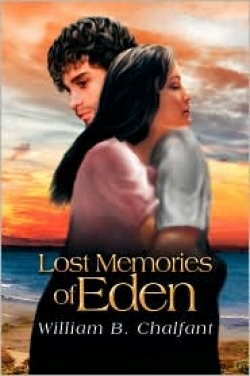Lost Memories of Eden
William B. Chalfant’s new book continues along the same vein as his previous four, exploring themes of love, family, and obedience to God in the ancient Christian world. Chalfant’s latest poignant novel, Lost Memories of Eden, tells the story of Noah. Initially, Lamech does not want to accept his son Noah because he thinks Noah is the product of his wife, Bathenosh, an angel who has taken human form, a Nephilim called Samhazi. The humans develop an uneasy coexistence with the Nephilim in their land, who steal human wives, even as they protect humans from bandits. There are even rumors that the Nephilim wish to rule over people and enslave them. Noah matures and weds. Meanwhile, Samhazi returns to abduct Bathenosh from Lamech, thereby igniting a rivalry between the Nephilim and Noah, which continues over several years and culminates in the Nephilim attempting to burn the famous Ark. Believers call upon fading memories of Eden to inspire human rebellion against the Nephilim. Much of the story concerns events prior to the Ark, so that the ship and God’s commands to build it represent merely one incident in the interrelationships of Noah’s extended family.
Although it is tough to tell them apart because there are so many, all of the characters possess flaws and virtues. Consequently, readers grow to care for all of them, knowing some humans will eventually die in the Flood. As the heavens open up, the audience feels genuine pity for those who chose to stay behind. Even Samhazi, the sneaky Nephilim, has redeeming qualities. Bathenosh, Noah’s wife, and many of the secondary female characters have active roles in the story. Chalfant excels in creating suspense, and he keeps readers turning pages to learn the characters’ next moves. His physical descriptions make the ancient world lush and real.
However, Chalfant has a tendency to tell instead of show. New characters pop up, often without much introduction, leaving readers struggling to remember how they all are related. The characters’ diction is jarringly inconsistent. Sometimes they speak with contractions; other times they don’t. Idioms, such as “playing with the big boys,” pepper their speech. Grammatically, Chalfant errs in punctuation, often omitting commas after quoted material, especially in dialogue. He also neglects to begin a new paragraph every time a different person speaks; this second error confuses the audience. Excerpts from the author’s other novels on his website reveal that the author consistently makes the same diction choices and grammatical errors so readers may become accustomed to his writing style. Regardless, the strength of Chalfant’s characters and his take on the Antediluvian world make Lost Memories of Eden a compelling read for audiences of any faith.
Reviewed by
Jill Allen
Disclosure: This article is not an endorsement, but a review. The publisher of this book provided free copies of the book and paid a small fee to have their book reviewed by a professional reviewer. Foreword Reviews and Clarion Reviews make no guarantee that the publisher will receive a positive review. Foreword Magazine, Inc. is disclosing this in accordance with the Federal Trade Commission’s 16 CFR, Part 255.

